|
4/21/2020 3 Comments Interview with Sage Adderley-Knox!You might remember Sage Adderley-Knox as the person who coached me through writing my first novel. In addition to being a badass writing coach, Sage is also an author on her own! Her Triple Goddess series follows Laura and Maggie, mother and daughter, as they explore their magical abilities. The second book in the series, Sisters in the Craft, just came out - you can add it on Goodreads and purchase it through Amazon now! Sage was sweet enough to share some info about her process with me - read on, then go to her website to learn more! 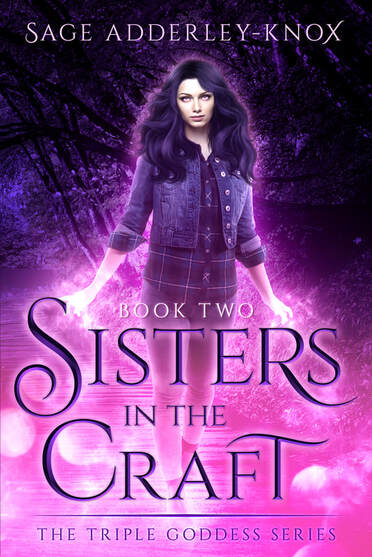 Look at this beautiful book cover! Look at this beautiful book cover! Shelley: Your Triple Goddess series is about witchcraft, but it feels very real. How did you create the magic system in your story? Sage: I wanted the characters to practice nature-based magic and show how that is done in our modern times. The spells are simplistic but hold powerful intentions. I did enjoy adding spirits, and in book two, we cross over just a tiny bit into the fae realm. Shelley: Sisters of the Craft is narrated by multiple different characters. Who was your favorite to write, and why? Sage: I really enjoy writing in Laura's voice. In book one, she comes off as rigid and not fully present, but as her story unfolds, you find out how much she has been through that has caused her to shut down. Writing Laura's transformation is an incredible feeling. Shelley: Sisters of the Craft takes place in 1977 and 1993. What do you like best about writing stories that take place in the past, and what are your biggest challenges? Sage: As a 90s teenager, I absolutely love going back to that time to reflect on its awesomeness - to talk about bands, fashion, and movies. It's a lot of fun for me. Writing in periods that I wasn't alive in can be challenging at times, but I make sure to research things and be as thorough as possible. 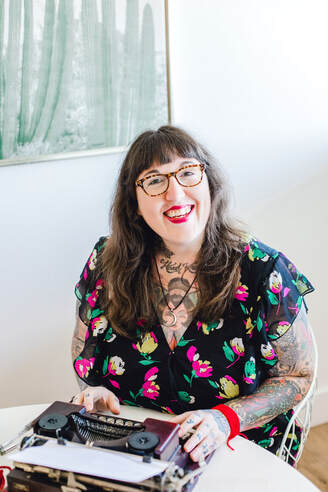 Sage also collects vintage typewriters! Sage also collects vintage typewriters! Shelley: Do you have the rest of the series planned out already, or is it still up in the air? Sage: It's mostly planned out in my head, so the next step is to get the outline down on paper and get back to writing! Shelley: You're both a writer and a book coach, in addition to being a mom. How do you balance your time and make sure you have time to focus on your own projects? Sage: Finding balance has been a struggle for me, which is why it took me years to release Sisters in the Craft, but this year, I made a commitment to myself that I would stop putting my creative work on the backburner. It's vital for me as a creative person to stay tapped into that part of myself and have a consistent practice. It also allows me to relate to my clients on a deeper level when I'm doing the same work. I get to be vulnerable and show up for myself, which in turn means I show up for my family and writers. As far as the mechanics of how I find balance, it's all about the schedule. I plan most of my days. I do leave spots open to be spontaneous, but find the structure of the schedule to be the anchor that keeps me focused and moving towards my goals. Shelley: How has your life changed since we've been quarantined? What have you been doing for self-care? Sage: Since the quarantine, all three of my kids have been home, so that is a big difference. Creating a school schedule and more meal times throughout the day has been a shift for us. My kids are 10, 16, and 19, so I feel fortunate that they are self-sufficient in a lot of ways. For self-care, I make sure that I'm moving my body every day. Sometimes that's going for a walk around the neighborhood, doing a yoga video, working in my garden, or having a dance party in my house. I get plenty of sleep, take naps when my body is tired, and make sure I'm doing things that help my body and mind feel restful. I also don't watch the news, which I think does wonders for my mental health. --- Sisters in the Craft is a journey of friendships that strengthen and break, budding love, and the mystical thread that connects three generations. Add it on Goodreads, buy it on Amazon, and follow Sage on Instagram now.
3 Comments
12/31/2019 0 Comments Shelley's Top Reads of 2019! (Part 2)Here's the content you've been waiting for . . . my favorite young adult reads of 2019! As a reminder, these aren't all books that were published in 2019; they're books that I read this year. I also recommend that you follow me on Instagram, where I post a book rec every Friday. Let's jump in, shall we? Birthday by Meredith Russo (2019) 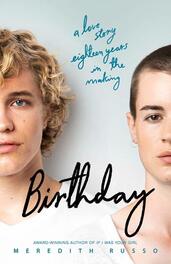 I really looked forward to this book's release, and it didn't disappoint! It's super beautiful and touching and I didn't want to put it down. It's about two best friends, Eric and Morgan, who were born on the same day and always celebrate their birthdays together. The story alternates narrators and checks in on them on their birthday every year from when they turn 13 to 18. Morgan is trans and figuring out how to tell people, especially Eric, and both characters are figuring out who they are. The story takes place in rural Tennessee and I really appreciated that - the setting plays a big part, and Meredith Russo addresses class more than a lot of YA authors do. Plus, there are so many feelings! The Downstairs Girl by Stacey Lee (2019) 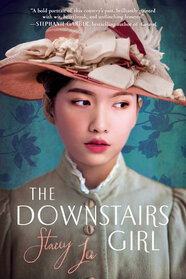 The Downstairs Girl is about Jo, an Asian-American teenager living in Atlanta following Reconstruction, who starts secretly writing an advice column for her local newspaper. And by "local," I mean that Jo and her guardian, Old Gin, live hidden beneath the printshop. Jo has a lot of secrets! I love Stacey Lee's writing and spunky characters, and Jo is no exception. She's clever, resourceful and radical, especially for the time. I love her relationship with Old Gin, and how the stories that Jo overhears from the newspaper staff upstairs helped raise her. She's a super memorable character, and an inspiration in how she finds ways to get ahead even though almost everything around her tries to keep her down. This book also contains a lot of interesting info about Atlanta society, hats, horses and about what it was like to live in Atlanta and not be white. The Long Way Down by Jason Reynolds (2017) 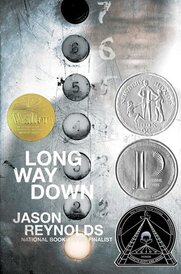 I chose this one for the Popsugar Reading Challenge prompt of "A book that takes place in less than a day." The story takes place over an elevator ride to the first floor, as Will decides whether to go after the man who shot his brother. As he rides, he's visited by the ghosts of several friends who were killed by guns. I listened to the audiobook, so I didn't realize initially that this book was written in verse. I did notice several lines that were beautiful and poetic, so learning that it was written in verse made a lot of sense. It seems like Jason Reynolds spent a lot of time choosing his words and picking just the right ones. It's a short book with a lot of emotion, tension and meaning. I recommend it highly! Girl Mans Up by M-E Girard (2016) 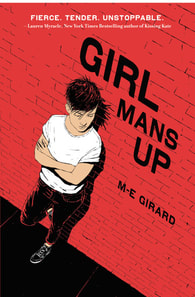 This one was on my TBR list for a while, and I finally read it this year. I'm glad I did! It's a really sweet, super feminist story about Pen, a teenage girl in Canada who doesn't want to be feminine. She and her best friend Colby have a routine where Pen helps Colby get girls, but things start to change when Pen wants to get to know one of Colby's crushes for herself. She also befriends one of Colby's exes and learns more about how her best friend treats the girls he dates. I loved Pen's relationship with her older brother Johnny, and I really liked reading her journey to accept herself. I love books that remind us that there are lots of ways to be a woman. (note: I've seen some reviews criticize this book for promoting the "not like other girls" trope, like that Pen is superior for not being feminine, or that the book maligns femininity. I didn't feel that way, but I know it's a hard line to walk - how do you express that these things don't feel right for you without criticizing people for whom they do feel right? So just a heads up before you dive in, and I'd love to know what you think!) Vivian Apple at the End of the World by Katie Coyle (2015) 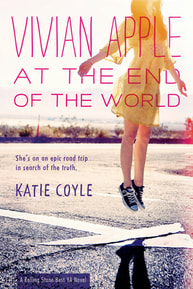 I read this one for my Young Adult Book Club. It's about a future where the Church of America runs most things in daily life, like commerce and TV, as well as religion. The Church of America also predicts that rapture is coming, and that true believers will be taken to Heaven. Vivian Apple doesn't believe this, but when she comes home and finds her parents gone and two parent-sized holes in the roof of their house, she's not sure what to think. In the chaos following the disappearance of so many people, Vivian, her BFF Harpreet and cute boy Peter head out on a cross-country road trip to find some answers. I thought Katie Coyle did a great job of setting up the world and the religion, and there were a lot of really exciting twists in the last half of the book. I also liked the diversity of the characters. After I finished this book, I went right on to the sequel, Vivian Apple Needs a Miracle, which I also recommend! 12/27/2019 0 Comments Shelley's Top Reads of 2019! (Part 1)The end of the year is almost here, so that means it's time for best-of-2019 lists! This year, I'm doing two best books lists. They're not necessarily books that were PUBLISHED in 2019, but are books that I read this year. This first list is non-fiction and adult fiction that I read this year, and I'll post my second list shortly, of my favorite young adult reads from 2019. For more Shelley book recommendations, follow me on Instagram! I post a book rec every Friday. Shelley's Top Adult Fiction Books of 2019 My Sister the Serial Killer by Oyinkan Braithwaite (2018) 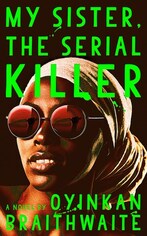 This book is really clever and surprisingly funny, especially considering the topic. It takes place in Nigeria and is narrated by Korede, whose sister Ayoola has a tendency to murder her boyfriends. And after Ayoola is done, she calls Korede, a nurse and meticulous cleaner, in to deal with the mess. When Ayoola sets her sights on Korede's crush, Korede has to decide whether to continue protecting her sister, or to look out for the man she secretly in love with. This is an adult novel, but the sisters live with their mom and the story is fast-paced like YA. I got wrapped up in the story right away, and I thought the author did an awesome job of describing awful acts in a way that made them seem understandable. Borderline by Mishell Baker (2016) 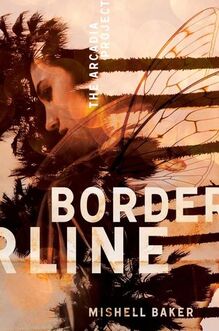 I participated in the Disability Readathon in October of 2019 and spent the month reading almost exclusively books by disabled authors. This book was one that I probably wouldn't have found if not for the readathon, and I'm so glad I did find it! The protagonist is Millie, who has borderline personality disorder and had both of her legs amputated after a suicide attempt. She's recruited to join the Arcadia Project, which monitors traffic to and from a parallel world full of fairies, witches, magicians and monsters. She's tasked with tracking down a fae who's gone missing in Hollywood, and moves in with a house full of other Arcadia Project staff while she looks for him. I loved how diverse and fleshed out the side characters were, and I also loved watching Millie navigate relationships with her BPD. This book is the first in a series, and so far I've read the second book (Phantom Pains) and loved it too! I recommend this one if you like urban fantasy and mysteries. Shelley's Top Non-Fiction Books of 2019 White Fragility: Why It’s So Hard for White People to Talk About Racism by Robin DiAngelo (2018) 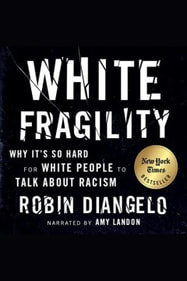 I recommend this to white Americans everywhere! I've never read a book before that's explicitly about whiteness. I feel like being white isn't something we're supposed to talk about or acknowledge, but this book is about the ways that we're trained to be white. It talks about the ways that white people segregate ourselves from people of color, the ways that different lives are assigned different value by media and society, how we're taught that people of color are dangerous to white people when it's really the opposite, and the way that white people tend to focus more on proving that we're not racist than on actually fighting racism. I think that, since the information in this book is coming from a white person, it's going to be a lot more digestible for white people than it would be if coming from a person of color. Which is shitty but true. Strangers Assume My Girlfriend Is My Nurse by Shane Burcaw (2019) 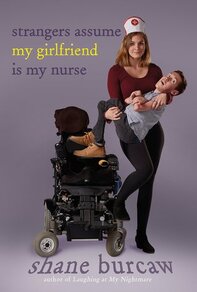 Another one I wouldn't have known about if not for the Disability Readathon. Shane Burcaw has Spinal Muscular Atrophy and has used a wheelchair since he was two. This is his second memoir, and talks a lot about his interactions with other people and how they treat him. It's a funny, interesting memoir, and seemed really honest. I liked the juxtaposition of humor (lots of dick jokes) with really personal, vulnerable writing. I especially appreciated the points he made about people treating him like he's sad or like his life must be sad, when he doesn't feel like his life is sad at all. It doesn't feel like a political book, and I feel like that makes it a really accessible introduction to ableism. The funny stuff makes the deeper stuff kind of sneak in. Rescuing Penny Jane: One Shelter Volunteer, Countless Dogs, and the Quest to Find Them All Homes by Amy Sutherland (2017) 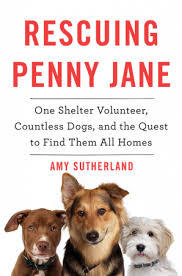 I've enjoyed every Amy Sutherland book that I've read, so I was super excited when, shortly after I adopted a shelter dog, I learned that she has a book all about shelter dogs! One funny thing about this book, though, is that she prefers dogs that are the opposite of my dog - older big dogs that have health conditions or trauma. She mentions puppies briefly, only to say that she feels embarrassed to admit that she's not that interested in them. She writes about her experience volunteering at her local shelter, and then goes in-depth into different shelter styles and techniques to get the dogs adopted. I learned a lot about dogs and shelters, and I also liked learning about Amy's personal experiences with individual dogs. I'm glad this book came into my life when it did! 11/24/2019 1 Comment Flexible goals!Well here we are, in the second half of November, and I’ve set two goals this year that I’m not going to finish. But I think it’s okay. And if you’ve set goals that you don’t end up finishing, that’s fine too! There are so many opportunities for us to feel like we’re not good enough. None of us need more guilt added to the pile, and beating ourselves up for not finishing goals is just going to teach us that it’s easier not to try. So be easy on yourself. Finishing part of a goal is better than not trying at all. Here are the two goals that I’m being flexible with this year: The Popsugar Reading Challenge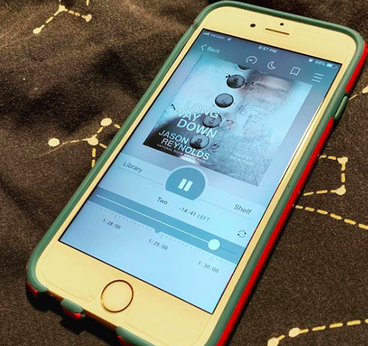 I loved The Long Way Down. I loved The Long Way Down. This is an annual reading challenge with a list of fifty prompts. You can take the base challenge by reading books that fit the first forty prompts, or do the advanced challenge by reading those forty plus ten more. I’d heard about the Popsugar Challenge before, but 2019 was my first time attempting it. I had high hopes at the beginning of the year and decided I would tackle all 50 prompts. I made lists and moved my books around, and I really liked planning my reading for the year. Usually, I search the library website and put anything that sounds good on hold, and sometimes find myself without a book and frantically scroll through the “Available Audiobooks” for something new. I didn’t have the problem of running out of books to read this year, because I always had plans for my next book. I was also a lot more intentional about the books that I read. I wanted to see how many of the challenges I could fill with queer authors and authors of color. In the end, I’ve done 40 of the 50 Popsugar prompts, and I’m in the middle of a book that will cover one more prompt. I mixed up the list and did some of the main 40 prompts and some of the advanced ten, so technically, I didn’t even finish the base challenge. But I still feel pretty good about what I’ve done. I read books I wouldn’t have otherwise, which I think is the point of the challenge. Some of them were great (like Crimson Lake by Candice Fox – “A book with no chapters, unusual chapter headings, or unconventionally numbered chapters” and The Long Way Down by Jason Reynolds - “A book that takes place in a single day”) and some of them were terrible, but overall, I read a lot of good books this year. And I look forward to being more intentional about my reading in the future. I like that I read more queer books this year than I have in recent years. I’m glad I tried the challenge, and I feel fine about giving up. NaNoWriMo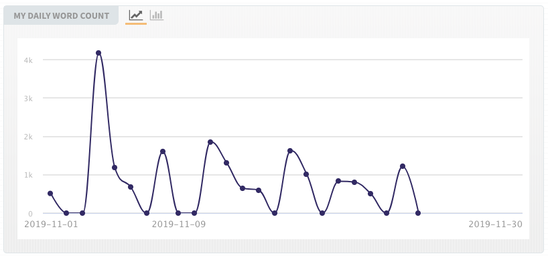 My daily word count has been all over the place! My daily word count has been all over the place! My other goal is a little bigger. National Novel Writing Month sets one goal – write 50,000 words during the month of November. This breaks down to approximately 1,670 words per day. When I was working on my first novel, I worked really hard. I would go to my job all day, then come home and be pretty antisocial from my partner and friends because I had to write. It wasn’t sustainable. And I don’t think NaNo is supposed to be a sustainable way to work – it’s supposed to kick your butt into gear and force you to get a lot of words onto the page. I’m doing that, but I’m not going to make it to 50,000 words this month. We recently added a puppy named Lewis to our family, and he doesn’t care if I want to write – he wants to play and go on walks and have quality time. He’s not old enough that I can just write and expect him to curl up next to me like our cats do – he needs active attention. Even if my partner tries to take Lewis duty while I’m writing, he wants to know why I’m in a different room and come see what I’m doing and get into things in my studio. Maybe I’m using Lewis as an excuse. I like hanging out with him, I like hanging out with my partner and friends, I like going to events. I don’t want writing to be a chore, I don’t want it to be something I have to do in order to write an amount that someone else decided was enough. In the couple of months leading up to NaNo, I hardly wrote at all. So going from that to writing almost every day, finding time to write in a way that actually feels kind of sustainable – like I’m not missing out on my life, but I’m still writing – that’s awesome. So far I’ve written a little over 18,000 words for NaNo. I have less than 10 days left in the month, so maybe I’ll get halfway. Learning to rest, not to quit.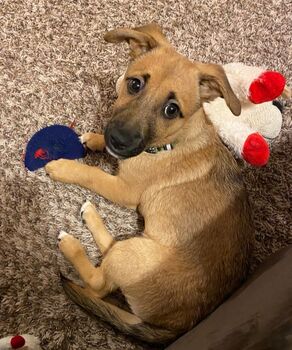 Don't you want to play with me? Don't you want to play with me? I think the risk of an ambitious goal is that it’s so easy to give up in order to avoid failing. On my second or third day of NaNo, I was so far behind already, I thought “there’s no way I’m going to get to 50,000 words. I should just stop.” But I recognized that writing a little is better than writing nothing. The best part of a flexible goal is that it can become attainable. You have to define success for yourself. We’re each on our own path, and there are always going to be people who seem to be farther along than you. At the same time, you’re further along than other people, and there are going to be people who think your progress is intimidating. Completing half of a goal is better than not trying at all, and it's okay to adjust your goals as you go along. 8/20/2019 0 Comments Zines!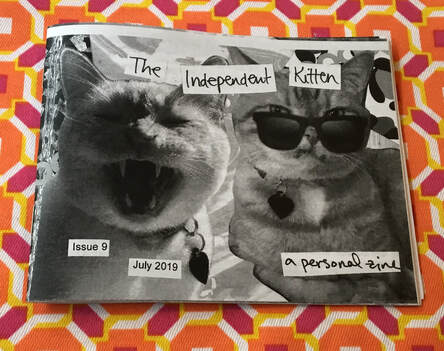 The Independent Kitten issue 9 The Independent Kitten issue 9 I made my first zine when I was sixteen. I honestly didn’t feel a pressing need to say something, I just wanted to be able to trade for zines that other people made. Zines seemed like such a cool medium, a community I wanted to be a part of. My first zine was called Cuaderno, the Spanish word for notebook, which I thought was cute and fun. I didn’t consider cultural implications at all, and when another zinester called me out on naming my zine with a word in a language that wasn’t mine, I’m not proud of how I reacted. I sent her a whiny letter about how I didn’t mean any harm (which, in my mind, made it okay), then changed the name of my zine with an article about how Cuaderno wasn’t “fun anymore.” I’ve written a longer article about this experience, but I haven’t shared it because I think it centers myself in a conversation about racism and white supremacy that shouldn’t be about me. (If you want to talk more about this, let me know.) My new zine was called Passing the Open Windows, which was a reference to The Hotel New Hampshire by John Irving, a novel my boyfriend at the time and I were in love with. The family in the story always tells each other “keep passing the open windows” as a way of saying “keep living” or basically, “don’t jump.” The zines had the same type of content, a personal zine (at times waaaaay too personal) with recommendations and collages and articles about stuff I like. And that’s basically still what I make zines about, because that’s my favorite type of zine. I love getting that little peek into someone’s life. During college, I made more one-off zines, and got into making cooking zines for a while as I learned how to cook for myself. I started The Independent Kitten when I was living in Portland and came across the phrase in a book of cat photos. It was a chapter heading with the perfect balance of strength and vulnerability, fur and claws. The Independent Kitten started as a purely personal zine, but the title makes people expect a lot of cat content, so I try for a mix of cats, personal, political, and recommendations. For several years in my twenties, I was on the organizing committee for the Portland Zine Symposium. Working to put on such a huge event taught me a lot about working with people, and I made mistakes that taught me how not to work with people. After I stepped down as an organizer of the Zine Symposium, I took a break from making zines for a while. In the last few years, though, I’ve been back, and I’ve been really enjoying the freedom of zines. I love the idea that anyone can make a zine about whatever they want, and I also love that there’s a community of people who want a way to express ourselves outside of mainstream publications. 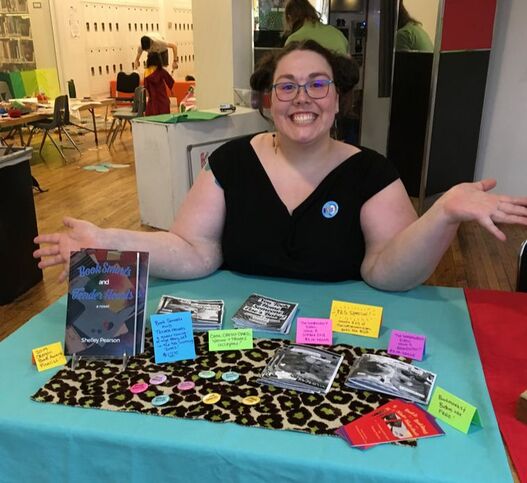 Me at my table Me at my table I tabled at the Portland Zine Symposium this year with my book and a new issue of The Independent Kitten. I got a table kind of last-minute, so I wasn’t able to sit with my friends, which pushed me out of my comfort zone. I got lucky in sitting next to Eunsoo from Koreangry, who is not only sweet, generous, and funny, but also makes amazing artwork. She builds meticulous miniature scenes and photographs them to make comics that are personal and political, and is someone I wouldn’t have gotten to know if we hadn’t been randomly assigned next to each other. The Portland Zine Symposium inspires me so much every year. I kind of love that the Olympia Zine Fest is a few months after the Portland Zine Symposium, which makes the perfect opportunity to get inspired in Portland and then make something new for Olympia. That’s what I did last year, with The Independent Kitten issue 8, but this year I decided to make a new issue in time for Portland. I’ll be honest, I did most of the work in the two weeks leading up to the Zine Symposium, and ended up copying issue 9 the evening before my tabling shift, and stapling at midnight while binging new episodes of Charmed. 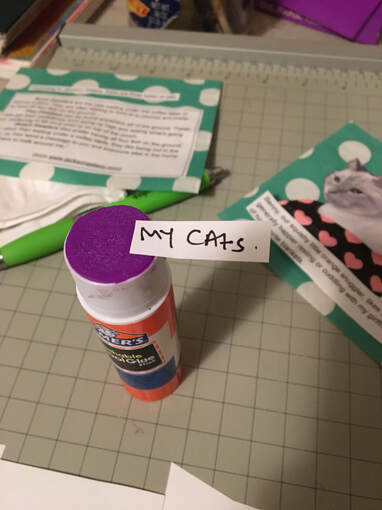 I do almost all of my layout by hand. I like small zines - quarter size has been my size of choice for several years. Each page is a quarter of a sheet of 8.5” by 11” paper, or 4.25” by 5.5”. I like this size because it’s easy to fit into a pocket or purse, and I can make a decently thick zine with only 4 sheets of paper. Writing the content is the hardest part for me, but once I have my long skinny column of text printed out, I love cutting it up, arranging the paragraphs, and gluing it all down. I love seeing the transformation from a chaotically-colored, taped-together stack of paper that’s all wavy with glue to a neat little black-and-white zine. Zines have been so central to my development as a person. Making zines and the people I’ve met through them have helped me figure out who I am. Zines have been there when I’ve had successes and failures, when I’ve been confident and insecure, kind and mean, making mistakes and growing and learning. I don’t know if I would have had the confidence to write my book if I hadn’t made and shared zines beforehand, and gotten positive feedback on my writing from my zines. So thank you to everyone who’s inspired me, encouraged me, put up with me, and been there, creating alongside me and making zines that are funny, interesting, and, above all, honest. 6/23/2019 0 Comments I want more from Pride!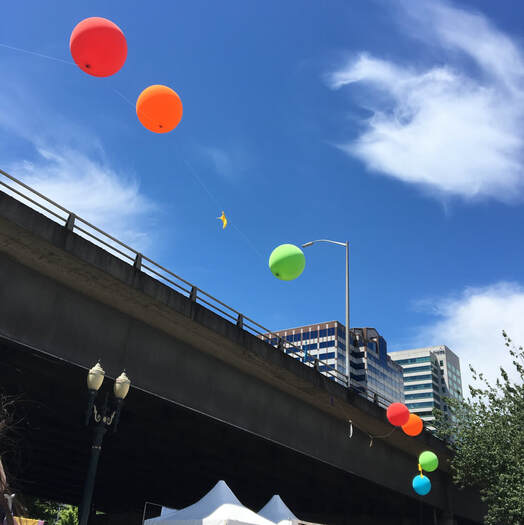 Look, I love Pride season. I am a pretty critical person, and while I’m working on being less critical of myself and the people around me, I still think it’s possible to both love something and think it can be better. And I think Pride could be better. My day job is in HIV prevention, so I’ve tabled at Pride the last few years, and I love tabling. It’s fun to be surrounded by people with trans/ace/pan/bi flags slung over their shoulders like capes, rainbow stickers on their cheeks and shoulders. I love the baby queers holding hands with their partners in public like it’s revolution. I love the rainbows everywhere. But it’s not enough. I don’t just want companies to slap a rainbow on their logo during June, rent a booth for the weekend, or order matching t-shirts and march in the parade. I want us to recognize that capitalism isn’t going to sustain us and business can’t keep expanding forever. I don’t just want a world where I can marry a woman, I want a world where marriage isn’t the default. I don’t want cops marching in Pride parades, I want a justice system that doesn’t disproportionately target black and brown people, trans people, and poor people. I want true safety, where trans people aren’t murdered, where cops don’t get away with whatever they want, where white cis queers recognize and use our privilege to lift up others who don’t have the same privileges we do. I want companies to stop donating to anti-LGBTQ politicians while they fly rainbow flags. I want to be more than a marketing demographic. I want all of us to support queer makers and small business owners instead of helping the rich get richer. What do you want from Pride? 6/9/2019 0 Comments Queer Up Your Social Media!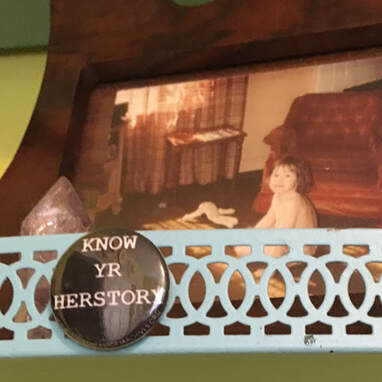 Photo of young Shelley to remind me about my personal herstory. Photo of young Shelley to remind me about my personal herstory. Hi everyone! Now that Pride Month is well underway, I want to encourage you to queer up your social media feeds! I follow several pages of queer content, and I like learning about our history whenever I check social media. What are the best pages you've found? Let me know in the comments! Here are a few of my favorites:
Do you follow any pages I should know about? Let me know below! 5/30/2019 1 Comment My Friends Are Awesome!Before I start a June full* of Pride-themed blog posts, I wanted to share an update on my Oregon Book Award nomination. It was a huge honor to be named a finalist and really exciting to attend the Oregon Book Award ceremony for the first time, but I didn't end up winning. The winner of Best Young Adult Novel was Shea Ernshaw for The Wicked Deep. In her acceptance speech, she mentioned querying agents when she was ten or twelve years old, so it was clear she's been working on her writing for a while. It was pretty amazing to even be included in the same category as Shea and the other finalists, Fonda Lee and Emily Suvada, especially considering this was my first novel and was self-published without a professional editor touching it. The most impressive part of the Oregon Book Award ceremony, though, was how many of my friends came out to support me. Five book club members, my stepsister and brother-in-law, and one of my coworkers joined my girlfriend and me in the crowd, and you better believe my friends made a ruckus when my book was announced. <3 <3 <3 It's hard to believe it's been almost a year since my book came out. Right now, I'm working on a second novel (not a sequel, but still queer YA). I've learned so much about publishing, writing, and marketing in the last year. Look for blog posts later this summer with more info about what I've learned! And don't forget - you too can go from an unpublished writer to an award finalist in a year! You just have to start writing now. My current goal is writing 10 minutes a day. It's a small goal, so it doesn't feel overwhelming, and I often find myself sticking with the work for more than ten minutes. Even when I don't write longer, I feel like I'm getting to know the characters better each time, and the word count really adds up. Overall, being nominated for an Oregon Book Award was such a wonderful experience. I got great feedback from the judges, and just feel so lucky and loved. Thank you all for your support!
* Regular followers of my blog will recognize that "full" is probably an overstatement here. 4/8/2019 0 Comments All About Book Clubs!Are you thinking about starting a book club? I love talking about books, and am currently in two book clubs, so I'm here to help! My two book clubs operate somewhat differently. My young adult book club meets monthly, and we all vote on our next six books twice a year. It’s a larger group, so we meet with whoever is available on the scheduled date, and people come even if they haven’t read the book...as long as they don’t mind spoilers. My other book club is smaller – four of us. We take turns choosing books to discuss, and we choose books that none of us have read before. For this group, we reschedule meetings until everyone has finished the book, which means we don’t read as many books each year. The three things you need to start a book club are: books to discuss, people to discuss them with, and a place to meet. Books to Discuss 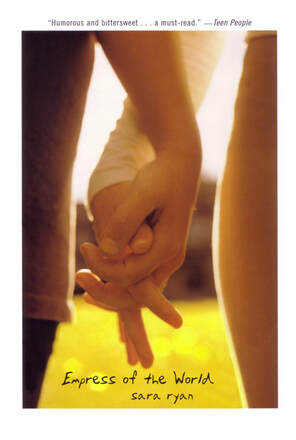 Empress of the World by Sara Ryan was the first book that I read with my young adult book club. <3 Empress of the World by Sara Ryan was the first book that I read with my young adult book club. <3 One reason to join a book club is to read books that you might not pick for yourself. So unless you find a magical group of friends with the exact same taste as you, you’re going to read some books you don’t like. And honestly, some of my favorite meetings are after everyone hates the book. We also have really interesting discussions when some people like the book and others don’t. As you talk about the books, you might find problems that you glossed over while reading, or notice worthwhile aspects of books that you thought were trash. If you have a stable group of club members, rotating picks keeps things pretty fair. With my small book club, we also have a plan in case new people want to join. Anyone is welcome to drop into a meeting by reading the book we’ve already agreed on and joining in the discussion. If someone new wants the power of suggesting books, they first need to come to four meetings, reading one pick from each current member, and then they pick the fifth book and become part of our rotation. I know it's kind of intense, but people are always saying they want to join, but only if they can pick the books. Not happening! This book club doesn’t have a theme, but we’re all trying to expand our knowledge of experiences outside our own, so we’ve mostly been picking books by women of color lately. For YA book club, we do things a little differently. There are about 15 people who rotate in and out of meetings, and the meetings usually have between six and ten attendees. We have a Facebook group, and when it’s time to pick new books, I make a document on the group page. Each member can add up to three suggestions to the document, and we copy in the book descriptions so the options are easy to review. At the beginning of the next meeting, we each vote for our top 6 books from the list. It can be really hard to choose, because we often end up with 20+ suggestions. If members can’t make it to the voting meeting, they’re allowed to send their votes with someone else. Whichever books have the most votes are our next six picks. If more than six books tie for the most votes, we do a run-off vote at the meeting. We assign the books to months based on topic (we usually try to have a scary book for October and light books during December, since the holidays get so busy) or availability (books that we know will have long waits at the library go at the end of the six months). People to Discuss Them With 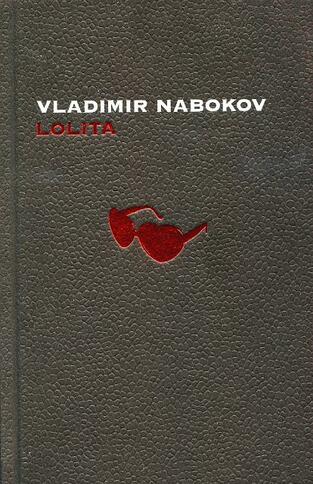 I suggested that my book club discuss Lolita, then I hated it and everyone else loved it! I like this cover though! Nice break from the usual. I suggested that my book club discuss Lolita, then I hated it and everyone else loved it! I like this cover though! Nice break from the usual. I mentioned the first purpose of a book club - to read new books and get better understandings of them through your discussions. The other purpose is to make new friends or connect more with your existing friends. My small book club has been going for ten(!) years, and started because two friends from college and I wanted to catch up regularly. We spend as much time chatting as we do discussing the book, if not more. My young adult book club has been going for about 8 years, and the participants have changed quite a bit during that time. This book club is open to the public, so a few people have joined by stumbling upon our Facebook group, but most people have joined through a friend. If you’re looking for a book club to join, look for Facebook groups, Meetup pages, or flyers in bookstores, libraries, or coffeeshops. Try searching by genre to find people who are interested in similar books as you. For example, the Forever Young Adult website lists book clubs around the world for adult YA readers. It’s hard to find people who aren’t flaky, which is how I ended up in charge of my YA book club. Someone has to be the responsible one, and if you’re committed to having a book club, it might have to be you. Start a Facebook group or a Meetup, make some flyers, and commit to showing up. There might be months when you’re the only one who comes to the meeting (it’s happened to me), or maybe there will just be a couple of you at first, but keep trying. Post on social media, on community bulletin boards at grocery stores, libraries, or bookstores. Ask the staff at those places if they know of anyone else who’s looking to form a book club, or ask your friends to ask their friends. I’m sure one of them is just dying to discuss books with you. A Place to Meet '>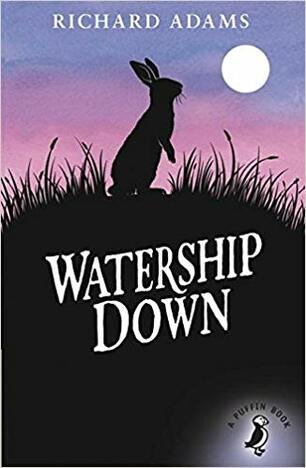 Everyone loved Watership Down! Becky even named her cats Hazel and Fiver. Everyone loved Watership Down! Becky even named her cats Hazel and Fiver. With a private book club, the place can be the easiest part. If you feel comfortable, you can rotate meeting at members’ houses. My small book club used to meet in restaurants, but we recently switched to meeting at the home of the person who suggested the book. It’s nice to not feel like we have to rush our discussion to free up the table, or worry about what we're saying in public. Plus, we get to see each others’ partners, pets, and kids, and show off our new stuff. Finding a space to meet for public book clubs can be challenging. My YA book club originally met at In Other Words feminist bookstore, which was an awesome resource for the community. Since In Other Words closed, we’ve been meeting at the Multnomah County Library. Libraries often have community rooms that you can reserve, as long as someone stays on top of making reservations and filling out paperwork. You can meet in a restaurant, but that means that most of the people in the group need to order food. Restaurants can also be noisy, especially if you’re a large group and can’t sit right next to everyone. Some coffee shops will let you hang out for a while if you buy drinks or pastries, which is a little less expensive. If anyone in your group has a connection to a college or university, maybe your group can reserve a space there. You can also try finding themed spots – if you have a queer book club, is there a queer community center in town that will let you meet there for a reduced price? Would a book store let you host a book club if some members buy the book there? It can take some searching. Now What Do We Talk About? 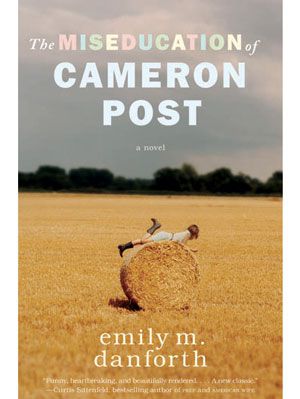 I loved this one! Click on the photo to see my thoughts about it on Instagram. I loved this one! Click on the photo to see my thoughts about it on Instagram. I like to start meetings with each person saying a sentence or two about their thoughts on the book. If not everyone knows each other, this is a good time to introduce yourself to the group, and you can also share any personal news. I like dedicated time for each person to speak, especially if they’re someone who tends to get spoken over. Going around is a good way to gauge the thoughts of the group on the book, and you can always come back to things that are mentioned here. If there’s a lull in the conversation, it’s nice to be able to say, “So, you said that you didn’t like the ending of the book. What didn’t you like about it?” I personally like to ask people who don’t speak up as much to elaborate on their opinions, which hopefully they don’t hate too much. For some books, you can find discussion questions online, which are helpful if the conversation hits a wall. If you’re looking for ways to prepare for your meeting, how about looking at the author’s Twitter feed or website, reading reviews of the book to see what other people think, or imagining who you would cast in the movie of the book? YA book club always ends with two questions: Who would you cast in the movie, and was this a feminist book? Once your book club gets going, you’ll also have a shared book history, so you can compare the book to others that you’ve read. If you run out of things to talk about in your current book, ask everyone what other books they’re reading, or what new releases they’re excited for. Have Fun! My last piece of advice for starting a book club is to have fun. This isn’t school, and no one should get shamed or feel bad for not finishing the book or for interpreting a book differently than someone else.
Good luck out there, and I hope you find your people and discover a ton of new, exciting reads! 3/28/2019 0 Comments I'm in a podcast!Big thanks to Emily and Corinne at Hybrid Pub Scout podcast for interviewing me about writing a book, self-publishing, the Oregon Book Awards, zines, and vulnerability. It was really fun to record my first-ever podcast, and it turns out I don't hate the sound of my own voice as much as I thought I would! Click at the link above or on the photo below to listen in! If you are bummed that I didn't talk a lot in the podcast about YA books that have influenced me, follow me on Instagram! Every Friday, I'm posting a different young adult novel recommendation. Some are books that have influenced my writing, and some are just plain great stories. Either way, I hope I can help you find some exciting new reads!
|
About Shelley
I like cats, feminism, queers, making things and writing, apparently. Archives
April 2020
CategoriesAll Art Book Reviews Book Smarts And Tender Hearts Events Fat Positive LGBTQIA+ Zines |
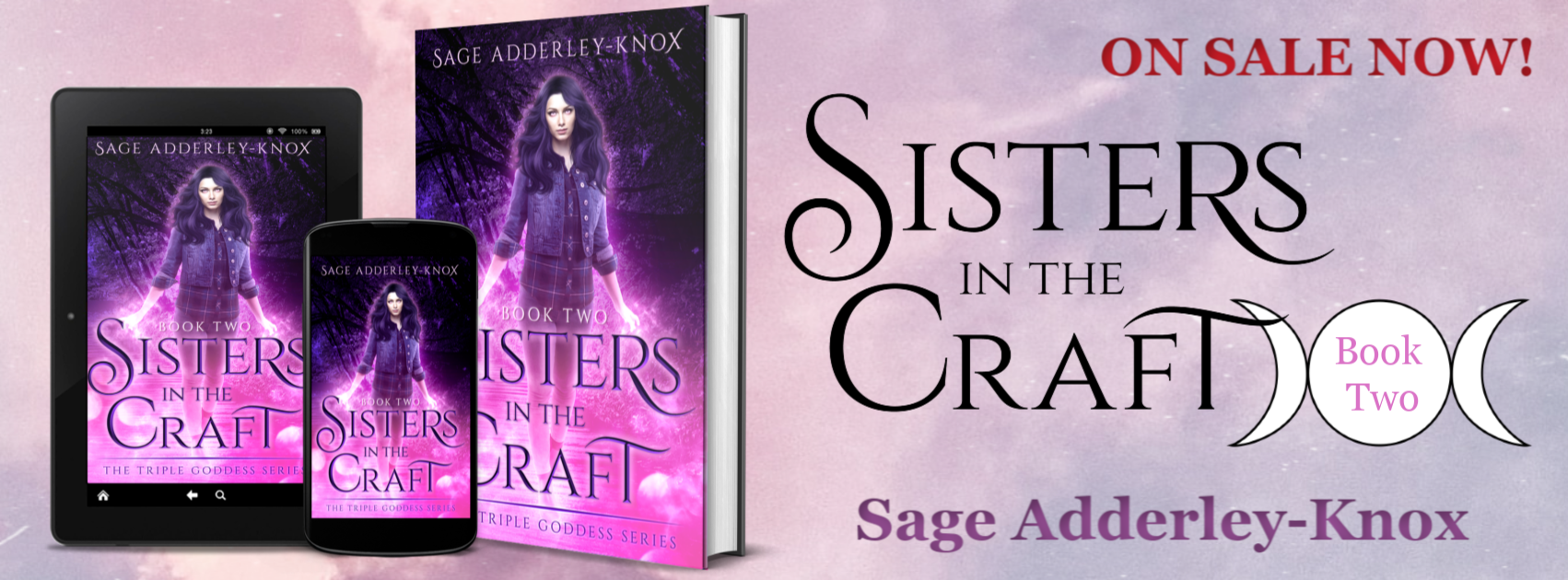
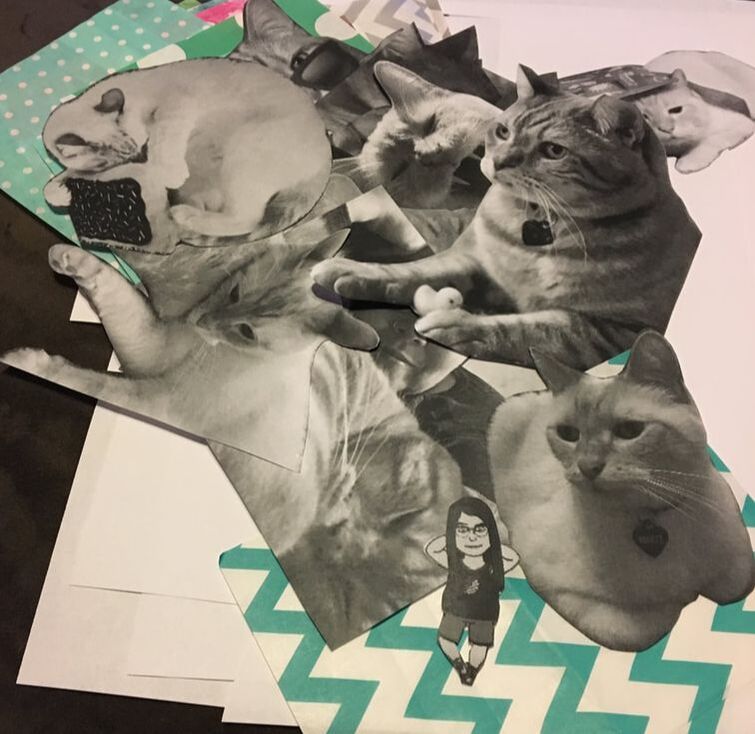
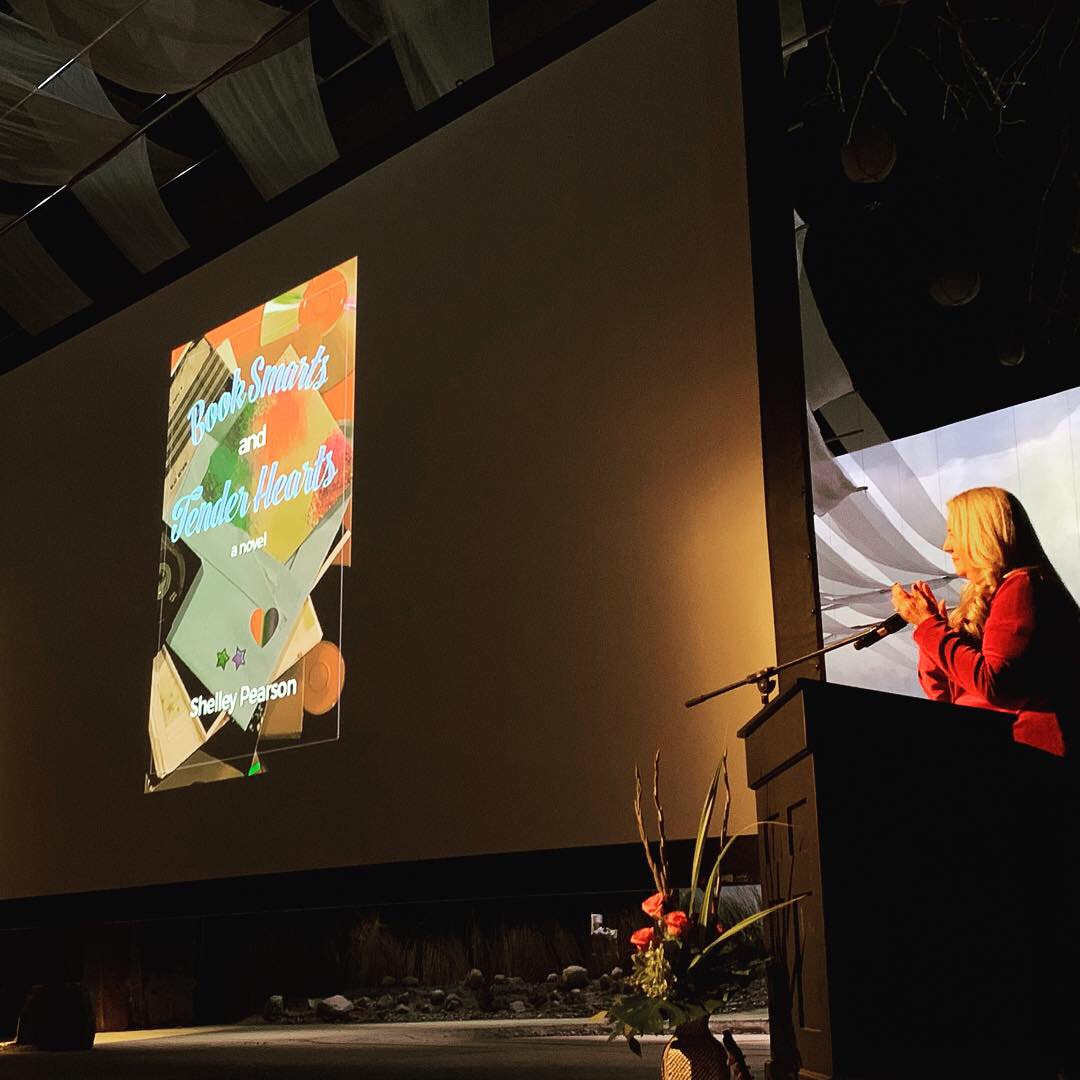
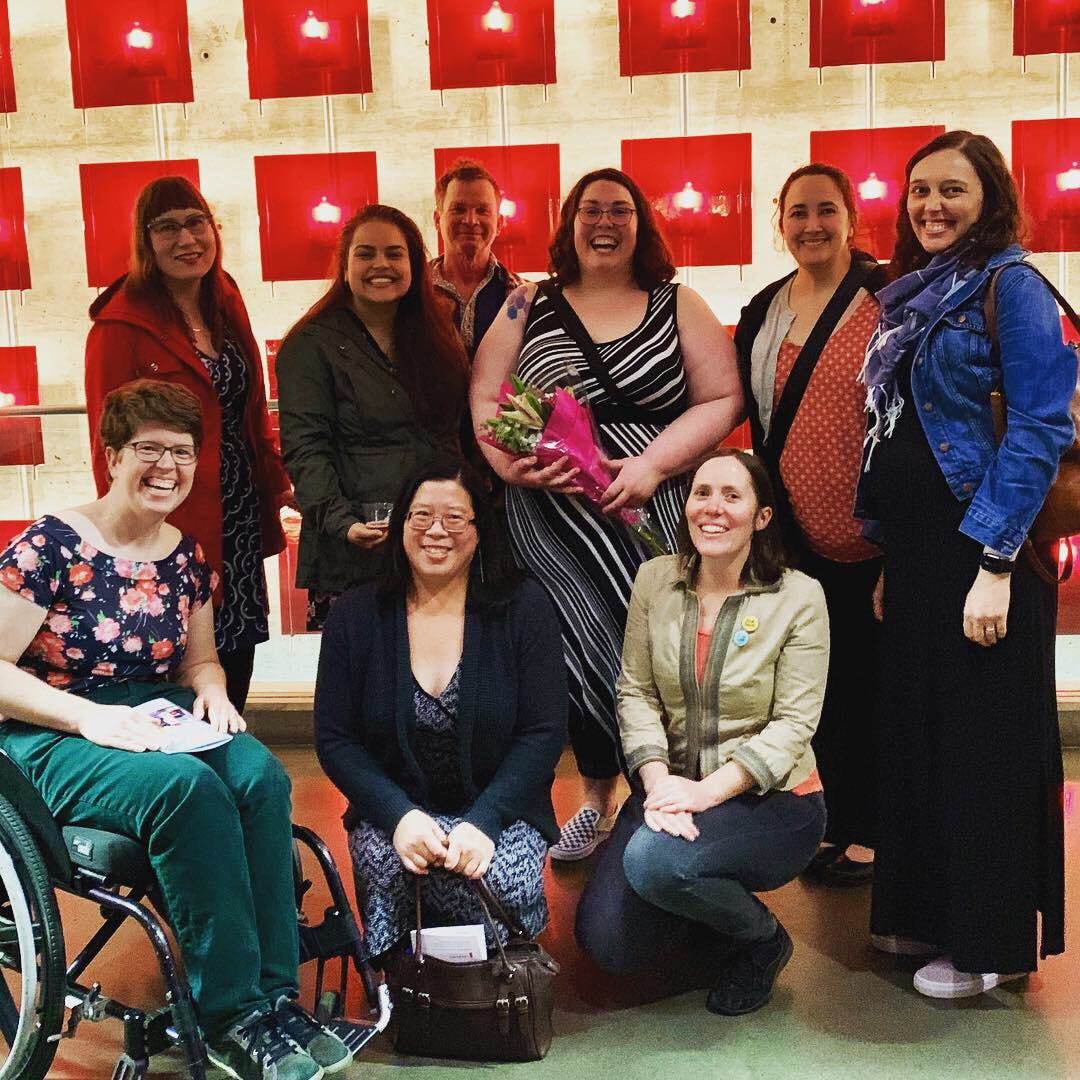
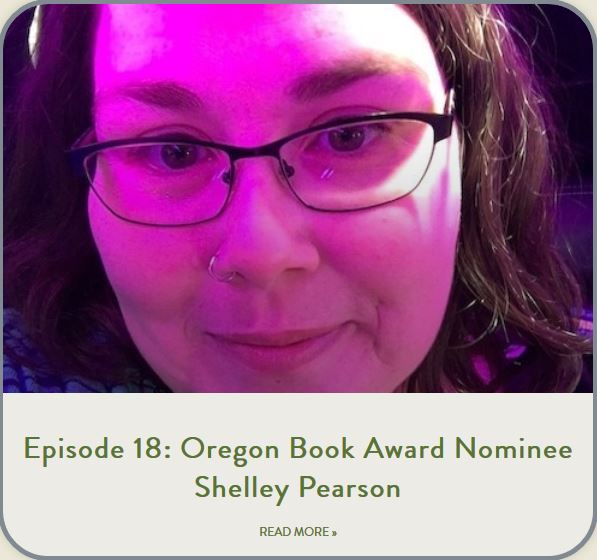
 RSS Feed
RSS Feed